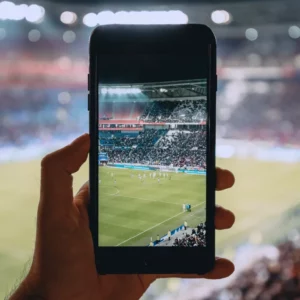As many industries take a step forward into the digital era, the sports industry is not immune to this trend. The use of different technologies is already creating great impact into consumer behaviour and the way fans engage with their favorite sports teams and brands. After all, stadiums have a limited amount of seats and nowadays, fans demand interaction and experiences beyond match day. The rise of Non-Fungible Tokens (NFTs) has been quite noticeable ever the past few years, disrupting the sports industry and evolving fan engagement.
NFTs are unique digital assets that can represent anything from digital art to in-game items and sports memorabilia. The advantage when it comes to this is that NFTs have their own immutable and verifiable ownership record, making them an engaging tool for sports brands when it comes to fan engagement.
NFT gating is the process of allowing access to private spaces like Discord or specific websites, through specific NFTs, taking fans into an even more unique experience. Instead of simply attending games or buying merchandise, fans can now collect and trade unique digital assets that allows them to become part of a community and access special experiences to engage with their favorite teams. By creating unique digital collectibles and experiences, teams can generate revenue beyond ticket sales and merchandise, expanding the brand’s universe into new and immersive experiences. This can be of great help to clubs and sports teams financially and to invest in new areas of growth and development.

Digital Twins, like Zetly and Transmira’s Omniscape fully photorealistic Sport Metaverse is a good example of how you can use digital assets to empower your fans with new experiences and create new levels of fan engagement anywhere in the world.
With this technology you can own an NFT that gives you access to a virtual version of your favourite club’s locker room or even the stadium itself. Which means your token has provided your fan, living thousands of miles away, the experience to tour around their favourite stadium without leaving home.
When we think about sports memorabilia, we should also take into consideration the distribution and logistics they have behind. When it comes to traditional sports memorabilia, we need to take into account distribution and number of units made. Whereas with NFTs sports brands can sell digital assets to fans all over the world without worrying about distribution, logistics and retail partners. This opens up a new revenue stream for sports brands, making it easier for fans to access and collect their favourite assets from anywhere in the world.
While all this sounds great, it is important for digital assets to have a utility beyond just being collectible in order to increase their value, sustainability and guarantee fan engagement. NFTs with a clear purpose can offer their owners additional benefits such as access to exclusive content, events, discounts on merchandise or even the ability to influence in certain team decisions. This gives fans a more tangible and meaningful connection to their favourite sports brands, as they are no longer just buying a digital asset, but rather an experience or privilege. By providing additional benefits to NFT holders, sports brands can create a loyal and engaged community of fans who are more likely to participate in future sales and promotions.
Overall, digital tokens when used correctly, can provide a new level of engagement and value to fans. As the sports and digital industries continue to evolve, NFT gating is likely to become an increasingly important part of the sports landscape.

